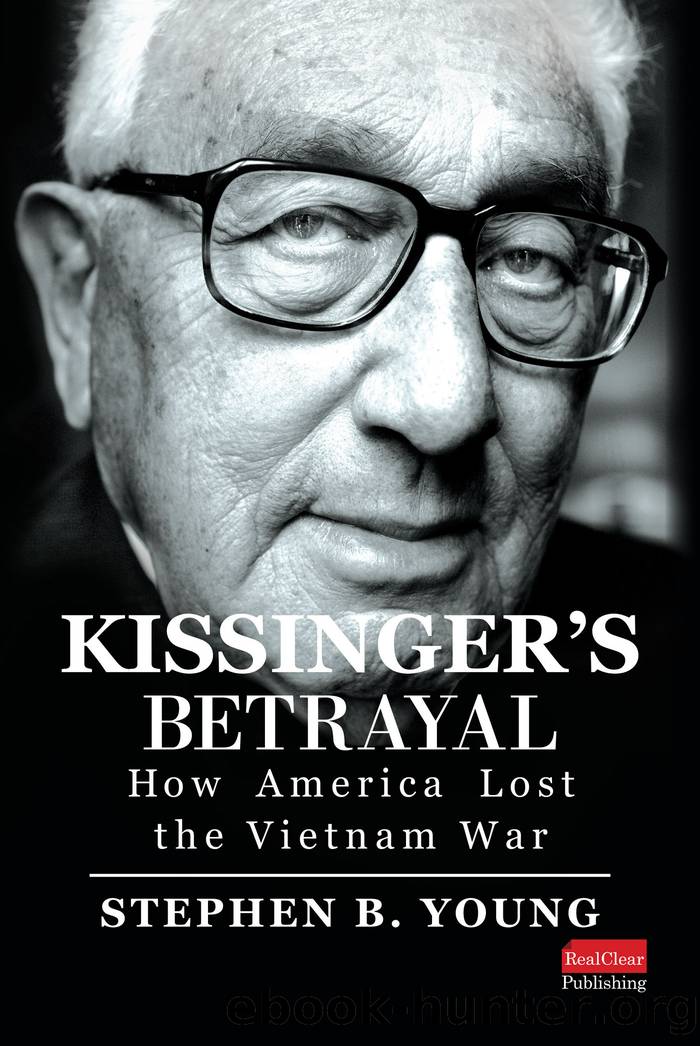Kissinger's Betrayal by Stephen B. Young

Author:Stephen B. Young
Language: eng
Format: epub
Publisher: Amplify Publishing Group
Published: 2023-02-08T00:00:00+00:00
Chapter 7
The Betrayal Is Consummated
Things are in the saddle
and ride mankind.
âRalph Waldo Emerson, âOde, Inscribed to William H. Channingâ
Henry Kissinger came to Saigon to inform South Vietnamâs leaders of the terms of peace with their Communist enemy that he had just reached on their behalf. It was not Kissingerâs intention to give Nguyen Van Thieu and his colleagues any significant role in determining how the United States would end its participation in the war to defend South Vietnam.1
Ellsworth Bunker, however, retained admiration, even some affection, for Kissinger. In a world where many spoke airily with ease and where even more lacked both convictions and courage, Bunker looked upon Kissinger as a man who used power well. Bunker judged others by the results of their undertakings. Kissingerâs intensity and quick mind were always focused on getting what he wanted. Bunker felt his spirits rise in Kissingerâs dynamic presence. With so many others acting from minimalist or even defeatist expectations, Bunker found Kissingerâs vitality a refreshing alternative.
Bunkerâs South Vietnamese counterparts had no illusions about Kissinger. What Thieu had always feared mostâthat Washington would permit North Vietnamese troops to stay in South Vietnamâwas now a reality. Accordingly, Thieu and his associates felt keenly that the American national security advisor had willfully betrayed them. They were understandably angry and bitter over this. In their minds, his peace agreement was nothing to celebrate. It was, from their point of view, a fatuous piece of worthless paper, only a photo opportunity, boosting him up personally to strut about on the world stage indulging in great intellectual condescension at their great expense.
Thieu had also not been consulted as promised before Kissinger had reached this understanding with Hanoi. Thieu had told the Americans that they were on their own in the negotiations, and Kissinger had gone ahead on his own without Thieuâs consent. What could the South Vietnamese do now to protect themselves? They could not alienate the Americans, but they didnât want to accept Kissingerâs terms for a temporary truce in their war with Hanoi, a truce that left Hanoi with impressive strategic advantages.
The reality was that Kissinger could easily have consulted with Thieu and even sought specific guidance from President Nixon after October 8, when Le Duc Tho had presented new and conciliatory proposals in Paris. Then, there had been time for Kissinger to ask for an adjournment of the negotiations to confirm that his president really wanted a peace agreement on such terms and to give Thieu a meaningful say in the negotiations.
Having negotiated only a âdecent intervalâ for South Vietnam, Kissinger now found himself very much on the defensive. He now proceeded to maneuver to extend the interval of âdecencyâ that Hanoi might provide for the Nationalists to be free of Communist dictatorship. He was caught between Hanoi and Saigon. He had to gain concessions from Hanoi to give more length to the âintervalâ while convincing the South Vietnamese that the interval he was providing for them to live freely according to their nationalist values would last and last.
Download
This site does not store any files on its server. We only index and link to content provided by other sites. Please contact the content providers to delete copyright contents if any and email us, we'll remove relevant links or contents immediately.
| Central Asia | Southeast Asia |
| China | Hong Kong |
| India | Japan |
| Korea | Pakistan |
| Philippines | Russia |
The Rape of Nanking by Iris Chang(3518)
The Sympathizer by Viet Thanh Nguyen(3487)
World without end by Ken Follett(3008)
Ants Among Elephants by Sujatha Gidla(2925)
Blood and Sand by Alex Von Tunzelmann(2610)
Japanese Design by Patricia J. Graham(2557)
City of Djinns: a year in Delhi by William Dalrymple(2137)
Inglorious Empire by Shashi Tharoor(2102)
Foreign Devils on the Silk Road: The Search for the Lost Treasures of Central Asia by Peter Hopkirk(2056)
In Order to Live: A North Korean Girl's Journey to Freedom by Yeonmi Park(2055)
Tokyo by Rob Goss(2018)
India's Ancient Past by R.S. Sharma(1988)
India's biggest cover-up by Dhar Anuj(1985)
The Great Game: On Secret Service in High Asia by Peter Hopkirk(1962)
Tokyo Geek's Guide: Manga, Anime, Gaming, Cosplay, Toys, Idols & More - The Ultimate Guide to Japan's Otaku Culture by Simone Gianni(1947)
Goodbye Madame Butterfly(1937)
The Queen of Nothing by Holly Black(1757)
Living Silence in Burma by Christina Fink(1731)
Batik by Rudolf Smend(1722)
